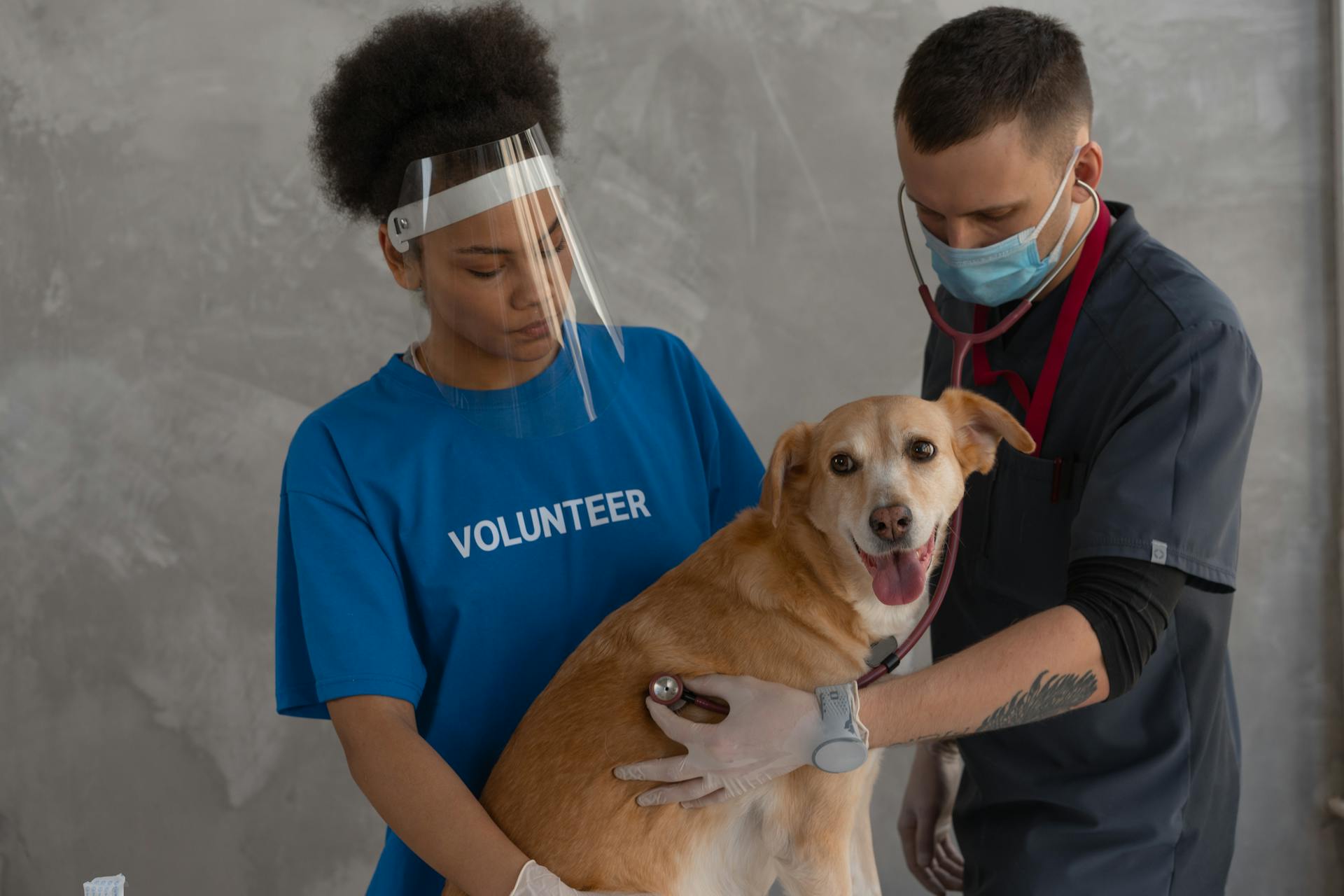
As a dog owner, it's essential to be aware of the potential health issues that can affect your furry friend based on their breed. Some breeds are more prone to specific health problems due to their genetic makeup or physical characteristics.
For example, Bulldogs are more likely to develop respiratory issues due to their flat face and short nasal passages. This can make breathing and exercising difficult for them.
Dachshunds, on the other hand, are at risk of developing back problems due to their long, narrow spines. This can lead to pain and mobility issues if left untreated.
Certain breeds are also more susceptible to eye problems, such as Cocker Spaniels, which can be prone to cataracts and progressive retinal atrophy. Regular eye exams can help detect these issues early on.
Regular veterinary check-ups and a healthy lifestyle can go a long way in preventing or managing these health issues.
Breed-Specific Health Issues
If you're a dog owner, it's essential to be aware of the potential health issues that can affect your furry friend based on their breed. Some breeds are more prone to specific diseases, and knowing this information can help you catch any problems early on.
Bulldogs, for example, are prone to respiratory issues. This means that if you have a Bulldog, you should be on the lookout for any signs of breathing difficulties, such as wheezing or coughing.
German Shepherds, on the other hand, are often affected by hip dysplasia. This condition can cause pain and lameness, especially after exercising, and can be treated with proper nutrition and therapy.
Some breeds are more susceptible to genetic diseases, such as hip dysplasia, von Willebrand disease, and entropion. For instance, Doberman Pinschers are prone to von Willebrand disease, which affects platelets and can cause bleeding issues.
Here's a list of some breeds that are prone to specific health issues:
- Bulldogs: respiratory issues
- German Shepherds: hip dysplasia
- Doberman Pinschers: von Willebrand disease
- Shar Peis: entropion
- Newfoundland dogs and Golden Retrievers: subaortic stenosis
- Collies: Collie eye anomaly and deafness
It's crucial to research the potential health issues that can affect your breed and work closely with your veterinarian to prevent or manage these conditions.
General Health Topics
Hip dysplasia is a common issue in larger breeds like German Shepherds and Labradors, leading to arthritis and mobility problems.
Bullying and joint issues can also be a concern for breeds like Bulldogs, who are prone to respiratory problems due to their short snouts.
Dental health is crucial for all breeds, but especially for small dogs like Chihuahuas, who are prone to tooth decay and gum disease.
Regular exercise and a balanced diet can help prevent obesity in breeds like Pugs, who are prone to this issue.
Some breeds, like Dachshunds, are prone to back problems due to their long, narrow spines.
Health Issues by Body System
Dental health is a significant concern for many dogs, with over 80% of dogs over the age of 3 suffering from active dental disease. This can lead to issues like fractured teeth from chewing hard objects, and periodontal disease, which is an infection and inflammation of the tissues around the teeth.
Dogs with certain body types are more prone to specific health issues. Large breeds like Rottweilers are at risk for joint problems, including hip dysplasia and arthritis. Bulldogs, on the other hand, are prone to respiratory issues.
Here are some common health issues by body system:
- Dental: Fractured teeth, periodontal disease
- Joints: Hip dysplasia, arthritis, elbow dysplasia
- Respiratory: Respiratory issues (Bulldogs)
- General: Heart, digestion, muscle, and joint problems (very large and heavy dogs)
Signs of Common Ailments

If your dog is coughing, it could be a sign of hip dysplasia, a common issue in German Shepherds. Regular vet check-ups can help with early detection and management of chronic conditions.
Vomiting and diarrhea are common symptoms of portosystemic shunt, a blood vessel birth defect found in small breeds like the Yorkie. This condition can be corrected with surgery.
Changes in appetite can be a sign of various health issues, including autoimmune disorders that affect the skin and eyes in Siberian Huskies. These conditions can lead to eye problems like glaucoma and cataracts.
Lethargy can be a sign of underlying health conditions, such as skin allergies in Golden Retrievers. Itchiness and scratching can lead to hot spots, which can be soothed with oatmeal shampoo and omega-3 supplements.
Here are some common signs of dog ailments:
- Vomiting
- Diarrhea
- Coughing
- Lethargy
- Changes in appetite
If you notice any of these symptoms, consult your veterinarian promptly for a diagnosis and treatment plan.
Canine Asthma
Canine Asthma is a serious health issue that affects many breeds. It can range from mild to life-threatening and causes a persistent cough, heavy panting, wheezing, low energy, and loss of appetite.
Dogs with Canine Asthma may require anti-inflammatory medications, including steroid pills and breathing treatments. This is similar to how humans use inhalers to manage asthma.
Some pet owners need to reduce their pets' exposure to cigarette smoke, molds, household cleaning products, pollen, and other asthma triggers. This can help alleviate symptoms and prevent exacerbations.
In severe cases, Canine Asthma can be a chronic condition that requires ongoing management. This may involve regular medication and breathing treatments to keep symptoms under control.
Curious to learn more? Check out: Pug Dog Breathing Problems
Genetic Diseases
Genetic diseases can be a significant concern for dog owners, especially if you're considering bringing a purebred puppy into your family. Many breeds are prone to inherited conditions that can affect their health and quality of life.
Some breeds are more likely to develop genetic diseases due to selective breeding. For example, Doberman Pinschers are at risk for von Willebrand disease, a condition that affects platelets. Bulldogs are prone to respiratory issues, while German Shepherds often face hip dysplasia.
For another approach, see: Common Diseases in Cocker Spaniels

Hip dysplasia is a common problem in large breeds, including Labradors, German Shepherds, Rottweilers, and Saint Bernards. It occurs when the joint's ball and socket don't fit together properly, causing pain, arthritis, and mobility issues.
Other breeds, such as Collies, are at risk for Collie eye anomaly, a group of related eye problems that can lead to blindness. If you're considering bringing a Collie puppy home, ask the breeder if the parents have been tested for this condition.
Some genetic diseases, like progressive retinal atrophy, can affect multiple breeds. This condition can cause blindness and is often inherited in breeds such as Poodles and Shetland Sheepdogs.
It's essential to be aware of the potential genetic diseases that can affect your dog's breed. Regular veterinary check-ups and genetic testing can help identify these conditions early on, allowing for proper treatment and management.
Here are some breeds and their associated genetic diseases:
- Doberman Pinschers: von Willebrand disease
- Bulldogs: respiratory issues
- German Shepherds: hip dysplasia
- Collies: Collie eye anomaly
- Poodles and Shetland Sheepdogs: progressive retinal atrophy
By understanding the genetic diseases that can affect your dog's breed, you can take steps to prevent or manage these conditions and ensure your furry friend lives a happy and healthy life.
German Shepherd: Hip Dysplasia
German Shepherds are prone to hip dysplasia, a condition where the joint's ball and socket don't fit together properly, causing pain, arthritis, and problems walking. This is especially common in large breeds.
If you're considering getting a German Shepherd puppy, ask the breeder whether the parents have been screened for hip dysplasia. Parents with healthy hips are more likely to produce puppies with healthy hips.
Hip dysplasia can be a painful and debilitating condition, but proper care and nutrition can help prevent or manage it. Feeding a balanced diet and maintaining a healthy weight can reduce the risk of hip dysplasia.
Here are some common signs of hip dysplasia in German Shepherds:
- Pain and lameness, especially after exercising
- Muscle wasting
- Running with a bunny-hop pattern
- Reluctance to jump and play
If you suspect your German Shepherd has hip dysplasia, consult with your vet as soon as possible to discuss treatment options and prevent further damage.
Labrador Retriever: Obesity
Labrador Retrievers are prone to obesity, just like people, and it's linked to health problems in dogs.
Dogs need vigorous daily exercise to stay healthy, so make sure your lab is getting enough physical activity.
Feeding your lab table scraps can lead to overeating, so it's best to stick to their regular diet.
Raw carrots, green beans, or apples can make great snacks for your lab if they're begging for more food.
Preventing obesity is easier than trying to lose weight, so consult with your vet on a diet plan that's right for your pet.
This will help ensure your lab stays healthy and happy.
Obesity is a common problem in dogs, affecting between 22 and 40 percent of them in Western countries.
It can cause numerous health problems, although dogs are less susceptible to cardiac and arterial issues than humans are.
If this caught your attention, see: Why Do Yorkshire Terriers Lick so Much
Boxer: Cancer
Boxer owners should be aware that their dogs are at higher risk for certain types of cancer, including lymphoma and mast cell tumors.
Lymphoma is a type of cancer that affects the lymph nodes and involves white blood cells called lymphocytes. It's essential to catch it early for successful treatment.
Mast cell tumors can have varied forms and may involve internal organs, in addition to skin cancer. They often feel like unusual lumps or bumps on your dog's body.
Regular check-ups are crucial for boxers to detect these cancers early, when they are more treatable.
If this caught your attention, see: Canine Cancer Awareness Month
Dachshund: Back
Dachshunds are prone to back problems due to their long bodies. They're at higher risk for back injuries and spinal disk problems.
Keeping your dachshund at a healthy weight is crucial to prevent excess strain on their back. Excess weight puts stress on the back, so monitor their food intake and exercise level closely.
Limiting stair-climbing and jumping down from furniture can also help prevent back problems in dachshunds. This will reduce the stress on their back and keep them feeling their best.
Here are some specific things to watch out for in dachshunds with back problems:
- Back injuries and spinal disk problems
- Excess weight putting strain on the back
- Stair-climbing and jumping down from furniture
Miniature Schnauzer: Diabetes
Miniature Schnauzers are at higher risk of developing diabetes, which can cause them to drink water excessively and have accidents in the house.
Any dog can develop diabetes, but Miniature Schnauzers are particularly prone to it.
Diabetes is a serious condition, but with insulin and diet changes, your dog can live a normal, healthy life.
If you suspect your Miniature Schnauzer has diabetes, it's essential to seek veterinary care right away.
You might like: Small Breed Boxer
Great Dane: Bloat
Great Danes are at higher risk for gastric dilation and volvulus (GDV), a life-threatening condition that develops when the stomach fills up with gas and then twists, trapping food and gas in the stomach.
If you notice your Great Dane pacing, panting, and drooling excessively right after eating, it's a sign of GDV and you should call the vet right away.
GDV can be corrected with surgery, but it can be fatal if not treated quickly.
A different take: How to Prevent Twisted Stomach in Dogs
Parasites
Parasites can be a real nuisance for our furry friends, causing skin irritation and even diseases that can be transmitted to humans. Fleas are a common parasite that nearly every dog will get during a lifetime, and they can suffer from severe itching all over their body, even if they've only got one flea.
Regular grooming and preventive measures, such as flea and tick control, can help maintain a healthy skin and coat for your dog. Fleas can be eradicated quite easily with the right medication, and there are many products available at pet stores to protect your dog from future infestations.
If this caught your attention, see: American Bully Dog Skin Problems
Ticks, on the other hand, are far more serious, and the paralysis tick can cause serious health problems for your dog, including poisoning of the blood and even death. Dogs are much more likely to pick up a paralysis tick if they are outdoor animals, interact with wildlife, or have access to bushy or grassy areas.
Some common external parasites that can affect dogs include:
- Fleas
- Ticks
- Mites (which cause skin problems such as mange)
- Mosquitos
- Lice (which can cause intense pruritus, scratching, and hair loss)
Internal parasites, such as intestinal worms, can also be transmitted through a dog's feces, and can cause varying degrees of discomfort. Heartworm is a dog parasitoid that can be fatal if left untreated, but prevention is easily achieved using medication.
Canine Dental Health
Canine dental health is a crucial aspect of your dog's overall well-being. Over 80% of dogs over the age of 3 have active dental disease.
Fractured teeth are the most common dental issue in dogs, often caused by chewing hard objects. This can lead to painful and expensive vet visits.
Explore further: Dental Health Diets for Dogs
Periodontal disease is an infection and inflammation of the tissues around the teeth, which can spread to the bone and cause tooth loss if left untreated. It's characterized by tartar accumulation on the teeth.
To prevent dental disease, daily brushing with canine-formula toothpaste is essential. Your veterinarian will likely recommend routine dental cleanings under anesthesia.
Here are some common dental ailments to watch out for in your dog:
- Fractured teeth
- Periodontal disease
Preventive measures include providing an appropriate diet, avoiding tinned and soft foods, and providing dental chew treats.
Causes and Prevention
Some breeds are more prone to specific diseases, so it's essential to know what to watch out for. Regular veterinary visits can help with early detection and prevention.
To prevent dog diseases, ensure your dog is up-to-date on vaccinations, provide a balanced diet, maintain regular vet visits, and keep them away from sick animals. Good hygiene and parasite control are also essential.
Certain breeds, like Bulldogs, are prone to respiratory issues, while German Shepherds often face hip dysplasia. Knowing your breed's common ailments can help in early detection and prevention.
Here are some common health issues by breed:
Regular grooming, a balanced diet, and preventive measures can help maintain a healthy skin and coat for your dog.
Preventing Health Issues in Pedigree Dogs
Preventing health issues in pedigree dogs requires attention to several key factors.
Regular veterinary visits are crucial to catch any potential health problems early on, just like the article suggests in Example 1.
Feeding a balanced diet is also essential, as excessive table scraps can lead to obesity, a common problem in many breeds, including Labrador Retrievers, as mentioned in Example 7.
Some breeds are predisposed to specific diseases, so it's vital to research your breed's common ailments, as Example 3 points out.
Additionally, selective breeding can lead to a lack of genetic diversity within breeds, increasing the risk of inherited diseases like cancer and blindness, as explained in Example 6.
To avoid the pitfalls of buying from an irresponsible breeder, use The Puppy Contract, as recommended in Example 2.
By taking these precautions, you can help prevent health issues in pedigree dogs and give them the best chance of a happy and healthy life.
A fresh viewpoint: Pedigree Dog Breeds
How Can We Help?
Owning a dog with health problems can be devastating, but there's hope for a better life. Your vet can help identify potential issues early on.
Don't believe everything you see on YouTube, especially when it comes to flat-faced breeds. Thousands of videos may show "funny Pugs snoring", but that doesn't mean it's normal.
If your dog snores or snuffles, or has any symptoms you've been told are "normal for [insert breed here]", ask your vet for advice. They can help determine if your pet needs treatment.
Your pet may be missing out on a more comfortable life if they're not receiving proper care. Don't wait - take the leap and ask your vet for help.
Consider reading: Preventative Care Keeping Your Pet Healthy Year-Round
Disease Types
Genetic diseases can affect dogs, especially purebreds, and some national kennel clubs have rules against registering dogs with certain genetic conditions.
Hip dysplasia is a common issue in large breed dogs, while von Willebrand disease affects platelets in Doberman Pinschers.
Entropion, a curling in of the eyelid, can be seen in Shar Peis and many other breeds.
Progressive retinal atrophy is inherited in many breeds, leading to vision loss.
Deafness and epilepsy are known to be inherited in some breeds, including Belgian Shepherd Dogs, German Shepherd Dogs, Cocker Spaniels, and St. Bernards.
Subaortic stenosis, or SAS, causes a narrowing of the passage of blood between the heart and the aorta, leading to heart problems and sometimes sudden death in larger breeds like Newfoundlands and Golden Retrievers.
Collies with blue merle or harlequin coloring can have severe genetic defects in their nervous systems and sensory organs if bred with another collie with the same coloring.
Readers also liked: Can Dogs Sense a Heart Attack
Frequently Asked Questions
Which dog breed has the least health problems?
There isn't a single dog breed that's completely immune to health issues, but some breeds like Australian Cattle Dogs, Beagles, and Border Collies are generally considered to be relatively healthy. These breeds are often a good choice for first-time dog owners or those looking for a low-maintenance pet.
Sources
- https://www.webmd.com/pets/dogs/ss/slideshow-dog-breed-health-problems
- https://bowwowinsurance.com.au/pet-community/pet-talk/top-10-most-common-health-problems-for-dogs/
- https://www.petsbest.com/blog/5-common-diseases-in-large-breed-dogs
- https://www.rspca.org.uk/adviceandwelfare/pets/dogs/puppy/pedigreedogs/health
- https://en.wikipedia.org/wiki/Dog_health
Featured Images: pexels.com


